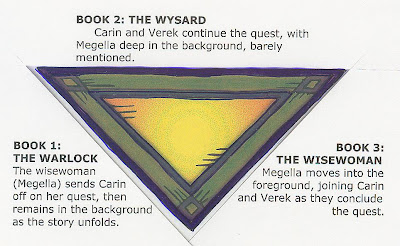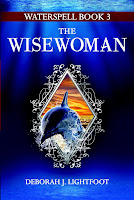“The difference between the almost-right word and the right word is really a large matter—it’s the difference between the lightning bug and the lightning. ... A powerful agent is the right word. Whenever we come upon one of those intensely right words in a book or a newspaper the resulting effect is physical as well as spiritual, and electrically prompt.”
—Mark Twain
“Short words are best and the old words when short are best of all.”
—Winston Churchill
“In the expression of the emotions originality merits the first consideration.... The words used, however, should be old ones.”
—Fujiwara no Teika (1162-1241)
Finding the right words for
WATERSPELL—words with the flavor of medieval speech and the patina of age on them; words possessing the virtue of brevity—became a great treasure hunt, luring me into hundred-year-old dictionaries, enriching me with the troves of golden synonyms that make English such a versatile tongue, and delighting me with the color and variety of the language as it once was used. Here is a glossary of terms from the trilogy that you may find as intriguing, in their unfamiliarity or their long history, as I did.
Key: Where possible, I’ve told what sort of word or phrase it is (dialectal English, old slang, archaic, chiefly Scottish, etc.) or named the date or the century of its origins in English (14c, etc.). Terms from the fictitious Ladrehdinian language (Lad) are boldface and italic, and you’ll just have to take my word that they mean what I say they do.
“You can be a little ungrammatical if you come from the right part of the country.”
—Robert Frost
arrah: Irish expression of surprise or excitement
bannock: a flat bread or cake of oatmeal or barley meal (British Celtic, before 1000)
bantling: a very young child (16c)
bedizened: dressed or adorned gaudily (1661)
betony: a plant of the mint family, used in medicine and dyeing (before 1000)
bindweed: a twining plant (vine) that wraps around and strangles whatever it grows upon (16c)
blackguard: scoundrel, villain (16c)
blackheart: warlock, witch, wizard or wysard, sorcerer (Lad)
blencathar: blind cave salamander (Lad)
bloodguilt: guilt resulting from bloodshed (16c)
bowstring: to strangle with the string of an archer's bow (14c)
bray: to crush or grind, as seeds in a mortar (14c)
buskins: laced boots (16c)
byre: barn (before 12c)
cadger: one who gets what he wants by imposing on another's generosity or friendship (Scots, 13c)
calendula: pot marigold; herb with showy, musky-scented flowers, used medicinally (1789)
callet-fish: cuttlefish (Lad)
caltrop: a device with four metal points so arranged that when any three are on the ground the fourth projects upward as a hazard to the hooves of horses (15c)
cant: lively, lusty (dial Eng, 14c)
cantrip: witch's trick, magic spell (Scot—probably an alteration of "caltrop")
carking: burdensome, annoying (16c)
casque-bug: insect of Lad. with a shape suggestive of a helmet (casque)
chalse: magical shackle or fetter (Lad)
chit: a pert young woman (16c)
clewbird: a bird of Lad. with fluffy feathers that give it a rounded shape suggestive of a ball of yarn (a clew) (before 12c)
cockcrow: dawn (13c)
costrel: a water bottle similar to a canteen, flat on one side to nestle nicely against the body for easy carrying (14c)
cyhnaith: a powdered healing herb, bronze in color and hotter than hell (Lad)
darkling: in the dark; vaguely threatening or menacing (15c)
dhera: a tart, sweet liquor made from currants (Lad)
didnae: didn't (Scots Eng)
farsinchia: netherworld of the damned; the infernal regions; hell (Lad)
faugh: interjection used to express disgust or abhorrence (16c)
fay: fairy, elf (14c)
fetch-life: wraith that fetches the soul of a dying person
feverfew: herb used as a remedy for fever and headache (15c)
fey: fated to die, or marked by an otherworldly air or attitude (Scots, before 12c)
fìleen: a term of endearment (Lad, akin to "filly" and the Irish "colleen" combined)
firedrake: a fire-breathing dragon (before 12c)
firestone: pyrite used for striking fire; flint (before 12c)
firkin: a unit of capacity equal to 1/4 barrel (14c)
firstling: the first of a kind; the first result; first offspring (16c)
footle: talk or act foolishly; waste time (1892)
footling: lacking judgment or ability; lacking use or value; trivial (1897)
forfend: ward off; prevent (14c)
gê: earth, ground (Lad, akin to Greek "geo")
gillie: a (young) male attendant or servant (Scottish Gaelic and Irish, 1705)
glenondew: antacid (Lad)
hell-wain: hell wagon (before 12c)
hyweldda: potion for treating concussion (Lad)
jennet: female donkey (15c)
kitling: young creature (Brit. dial., 13c)
knacker: buyer of worn-out domestic animals or their carcasses to use as animal food or for their hides (1812—probably from Eng. dial. "saddlemaker")
Lake Maidens: Welsh fairies of the underworld, whose entrance to the human world is by the lakes
lathy: thin and narrow like a lath (13c)
lay: a narrative poem (13c)
lurcher: one who lurks; spy (archaic)
Macassar-Oil: an oil used as a hairdressing (1800)
minx: a pert, impudent girl
numbles: animal entrails used as food (13c)
quillwort: a fernlike, aquatic plant with quill-like leaves
ravening: rapacious; voracious (16c)
recto: right-hand page of an open book; on the right-hand leaf
reiver: raider (Scots, before 12c)
savitar: mythical monster similar to a dragon (Lad)
scrag: execute by hanging or garroting; wring the neck of; choke, manhandle; kill, murder (1752)
’scried/’scrying: shortened form of “descried/descrying”—finding out; discovering (14c)
scurf: dandruff (before 12c)
skimble-skamble: rambling or confused; senseless (16c)
slipstone: fine-grained sharpening stone for putting an edge on a knife
smallclothes: underclothes
spade: a unit of length (dimension unknown; this use of the word spade comes from “The Banshee of the MacCarthys,” in Irish Fairy & Folk Tales: “My mother ... asked Leary ... how far we were from Mr. Bourke's? ‘’Tis about ten spades from this to the cross [crossroad], and we have then only to turn to the left into the avenue, ma'am.’”)
span: the distance from the end of the thumb to the end of the little finger of a spread hand; equal to 9 inches (before 12c)
sprat: a small or young fish; by extension, a young, small, or insignificant person
starveling: one who is thin from lack of food (16c)
stone: a unit of weight, equal to 14 lbs. (before 12c)
strap oil, dose of: punishment (old slang, from "a flogging with a strap")
tatterdemalion: a person dressed in ragged clothing (1608)
tench: a freshwater food fish (14c)
trull: loose woman, strumpet (16c)
unchancy: dangerous (Scot—16c)
varlet: a base unprincipled person; knave (15c)
verso: left-hand page of an open book
vetiver: long, fragrant roots of a grass yielding an aromatic oil
wencel: child, girl (Old Eng, giving rise to "wench," 13c)
whiffet: a small, young, or unimportant person
wight: a living being; creature (before 12c)
woad: an herb yielding blue dyestuff from its leaves (before 12c)
woundwort: a plant of the mint family, used medicinally (16c)
Lest enthusiasm run away with me, another line of good advice is:
"In composing, as a general rule, run your pen through every other word you have written; you have no idea what vigor it will give your style."
—Sydney Smith, Lady Holland's Memoir (1855)




